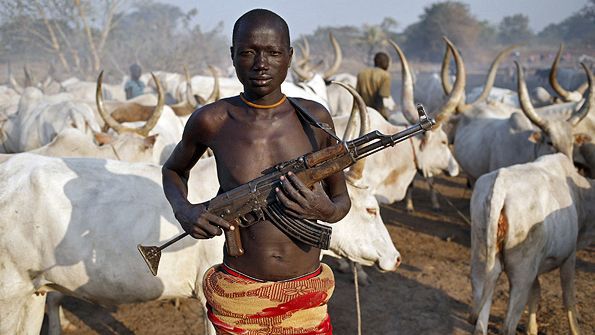
On the eve of the publication of his major new monograph, Gufu Oba considers the genesis and wider impact of his work. Herder Warfare in East Africa will be published on Monday 15 May.
Warfare is as ancient as human society. It is destructive and emotive, yet human history is marked by wars. Statues of heroes and heroines in memorial parks are scenes of annual pilgrims by families and national leaders, while the sites of wars of independence are preserved as national monuments for posterity. The generals who planned and achieved victories in wars have gone down into the annals of history, passed from one generation to another. Hundreds and thousands of books have been written on both ancient and contemporary wars in different places and among different cultures. This is no different for ancient and contemporary pastoralists communities, whose history has been punctuated by wars and conflicts over resources. Past wars are preserved in oral traditions, folklore and poetry.
In childhood, sitting at the feet of my father…I heard stories about past wars in which our society participated. The war telling was complex. The elders narrated large scale excursions into the enemy territories through ritual wars or wars of defence, each war remembered by poetic songs recounting the foretellers visited
At present in East Africa, with its large pastoralist populations, cattle rustling, banditry, raids, secessionist wars and open warfare between opposing groups have gained political prominence, posing multiple threats to peace. For their own security, pastoralist groups have formed clan militias, sometimes graduating into insurgency. I was therefore interested in the history of warfare among herding societies in East Africa, to understand if there are social, political and resource causalities of wars. I selected the past over the present wars.
In childhood, sitting at the feet of my father, himself a great storyteller, I heard stories about past wars in which our society participated. The war telling was complex. The elders narrated large-scale excursions into the enemy territories through ritual wars or wars of defence, each war remembered by poetic songs depicting the performances of war rituals that the warriors underwent, the war leaders and the identities of the enemies. The stories were not isolated, as each pastoralist group had comparable stories to tell about the wars in which their fathers and ancestors participated, tales of livestock looted and people kidnapped and killed. Every war had a name, often derived from a famous victim, warrior or geographical space. Wars were time markers in history, with periods being referred to as the time of this or that war.
My aim in this book was to understand the regional dynamics of herder warfare along seven frontiers, involving conflicts among multiples of groups over centuries, with case studies focusing on two of the seven frontiers. By the late nineteenth century, the case study frontiers – the coastal hinterland of East Africa – represented the convergence of different wars involving various pastoralists and settled groups. Along the warfare frontiers arose potent military powers that were involved in the conquest of their neighbours and the enslaving or recruitment of defeated groups. Thus, each of the frontiers had historical footprints of warfare in terms of the geographical spaces and specific ethnic groups involved. My book weaves varieties of sources into a tapestry of regional warfare.
The work intertwines social and environmental histories of warfare. Methodologically, it has broken new ground in bringing into the same narratives the oral traditions of pastoralists and other sources. The chapters, while they could be read separately, describe trajectories of histories of warfare along the different frontiers of conflicts. This is the first work from East Africa that reports on domestic slavery as the byproduct of warfare and, for the case study communities, analyses the processes of enslavement and eventual emancipation. This new angle will undoubtedly encourage more research on the roles pastoralists in East Africa played in nineteenth and early twentieth century slavery.
The book reflects a clear and comprehensive knowledge of pastoralism and its environments, acquired over several decades of academic life and early upbringing. This personal knowledge is reflected in a writing style that neatly weaves the social and environmental perspectives of warfare with details that are accessible to both non-specialist and specialist readers. I recommend this book for senior undergraduate and graduate courses in conflict and warfare studies. I also expect the book i to be of interest to professional researchers and general readers of warfare, conflicts and environmental history. It is my hope that readers will find this book of interest.
Based on a blog post first published by Whitehorse Press.
Read another of Gufu’s blog posts on this book, published by Whitehorse Press in January this year.
 Gufu Oba is a Professor at the Department of International Environment and Development Studies at NMBU. His interdisciplinary research includes the themes of climate change, pastoralist livelihoods, social and environmental history.
Gufu Oba is a Professor at the Department of International Environment and Development Studies at NMBU. His interdisciplinary research includes the themes of climate change, pastoralist livelihoods, social and environmental history.


